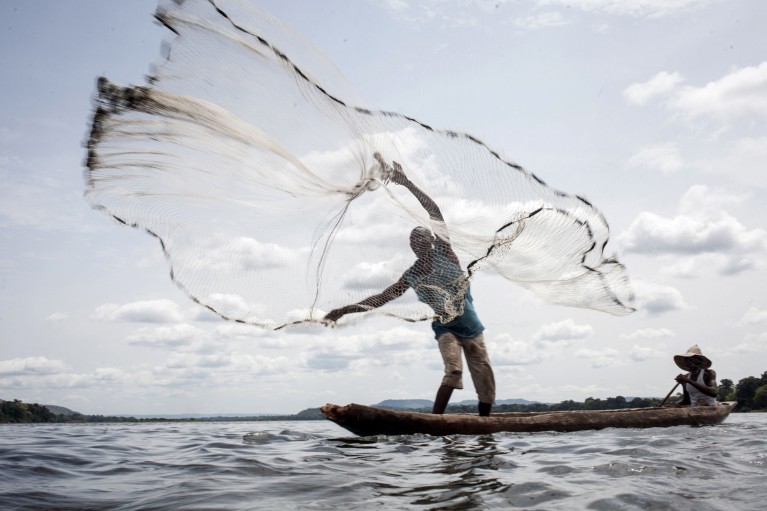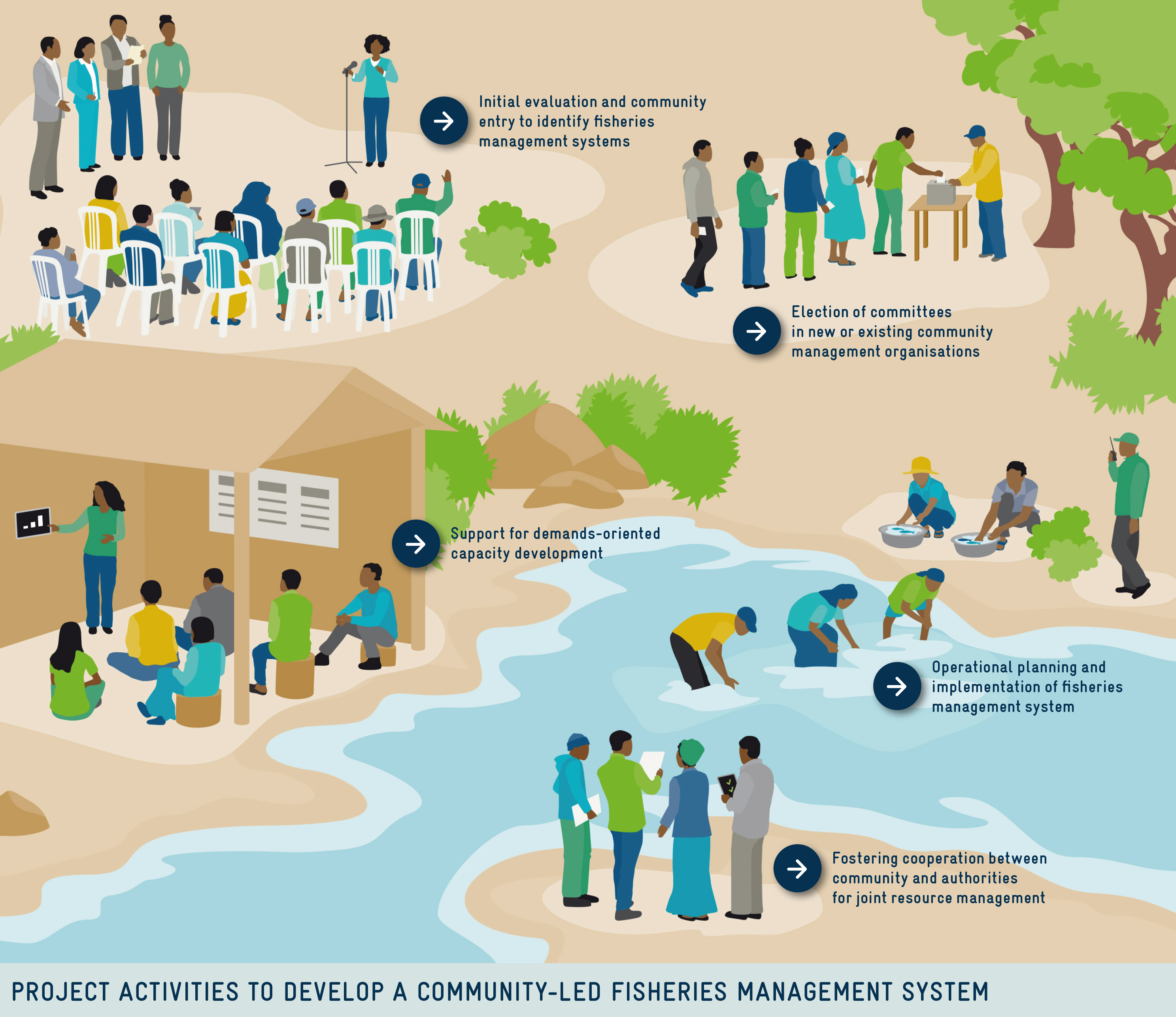Small islands face a unique set of challenges, from limited arable land and high reliance on food imports to climate change issues. In these conditions, small-scale fisheries are more than just an economic sector. They are pivotal for providing essential food security and nutrition, supporting local livelihoods, and holding deep cultural significance. They represent the Multi Capital Approach, one of THRIVE Project’s Foundational Focus Factors (FFFs). This highlights the importance of financial, natural, social, and cultural capital to build resilient small-scale fisheries in island nations.
Why Small-Scale Fisheries Matter
Definition
Small-scale fisheries are critical for the well-being of millions, especially in island nations. Globally, they supply about 40% of the world’s fish catch. Most small-scale catch is consumed locally, supplying 2.3 billion people with key dietary micronutrients (FAO, 2020). According to the World Bank, fisheries employ 62 million people, generating USD$77.2 billion of economic value (Basurto et al., 2025).
While there is no single definition of small-scale fishing, it is differentiated by the nature of the vessel, the gear types, and the distance they fish from the shore. Typically, small-scale fisheries include indigenous, artisanal, and small-scale commercial or non-commercial operations. They involve small vessels with fixed fishing gears operating in inshore areas close to their home ports. Fish from wild capture small-scale fisheries in island nations are vital for food security, particularly in developing countries of the Global South (Arthur et al., 2021). This highlights the importance of the THRIVE Project’s FFF of Strong Sustainability, which emphasises that natural resources are finite and irreplaceable. It advocates for a Systems Thinking approach to secure sufficient nutrition for island communities while keeping fishing practices within ecological limits.
food security & nutrients
In the Pacific, coastal fishing provides income and food for roughly half of all households (World Bank, 2024). As small island states have limited farmland or arable land, reliance on locally caught fish is very high. This means that robust artisanal fisheries often make a huge difference between hunger and adequate nutrition. Around half of nutritionally vulnerable coastal countries rely on small-scale fisheries for at least 15% of their nutrient supply.
In São Tomé and Príncipe, Africa, fish accounts for 90% of animal protein consumed. In small, low-lying Pacific island nations like Tuvalu and Kiribati, fishing families eat local fish 5 to 6 times per week (Chand, 2024). Many of these nations face high risks of nutrient deficiencies. For example, in countries like Somalia, Sierra Leone, and Madagascar, inadequate nutrient intake is estimated to be 50–90%. Yet small-scale fisheries still provide 20–40% of available nutrients (Viana et al., 2023).

Source: Nature, 2025
Supporting Island Economies
Fishing often ranks among the top economic sectors in island nations. Industries such as tourism and fisheries account for half of GDP in some small island states like the Seychelles and Maldives (UNDP, 2024). In the Seychelles, fisheries are the second largest industry, employing about 17% of the population. The Maldives relies on fish products for 98% of all exports (IEG, 2022). Even when fisheries account for a modest share of GDP, they support rural communities with few other opportunities.
A small-state fisheries value chain (from catching and processing to selling and boat repair) sustains hundreds of thousands of people. This helps lift families out of poverty (FAO, 2020). Women play a major role in post-harvest processing and marketing, extending household income well beyond the fishing boats. Hence, by providing steady work in remote areas, small-scale fishing offers a vital pathway out of poverty for island populations.
Barriers to Sustainable Fisheries
Insufficient infrastructure & market access
In many island communities, small-scale fishers lack reliable boats, gear, cold storage, and transportation. They often rely on middlemen to reach markets. This can trap them in low-return cycles and leaving them economically vulnerable (Schmidt, 2025).
environmental & climate pressures
Over-exploitation of fish stocks is a serious problem. The World Bank warns that warming, acidification, overfishing, and coastal pollution are pushing fishery resources towards a state of crisis (World Bank, 2025). Climate change is especially heightened for low-lying islands and coral reefs. It causes coral bleaching, sea level rise, ocean acidification, and more intense storms (UNDP, 2024). Shifting or declining fish stocks from over-exploitation add further pressure on the resources small-scale communities depend on.
governance gaps & inequality
Small-scale fishers in island nations are often marginalised in policy and law. They may have little formal rights or voices, leaving them vulnerable to illegal, unreported, or unregulated (IUU) fishing. For example, studies report that “there isn’t a lot of choice for people in the small-scale sector [where] IUU has become a necessity” (Bartlett et al., 2025).
socioeconomic vulnerabilities
Low and unstable incomes, lack of alternative livelihoods, and social inequalities keep many fishers and their families in poverty. The vulnerability of small-scale fishing communities can lead to economic traps (Villasante et al., 2022).

Source: Nature, n.d.
integrating fisheries into the blue economy
Blue economy refers to the sustainable use of ocean resources to drive economic growth, support improved livelihoods, and protect ocean ecosystem health. It offers island nations a unique opportunity to elevate small-scale fisheries. However, integration must go beyond broad economic rhetoric to ensure artisanal fishers are key beneficiaries rather than sideline participants (Ayilu et al., 2022). For example, the FAO Voluntary Guidelines on small-scale fisheries in island nations were developed to secure fishers’ rights and promote sustainable practices. These guidelines foster collaboration among governments and communities, and promote responsible, equitable fisheries management (Nakamura et al., 2021).
Additionally, island states are investing in projects that improve fishing practices while generating income. For example, the Seychelles launched the world’s first sovereign blue bond, a 10-year USD$15 million bond funding sustainable fisheries, aquaculture, and marine conservation (World Bank, 2018). In the Eastern Caribbean, the “Unleashing the Blue Economy of the Caribbean”, a multi-country USD$60 million initiative, is helping island governments to strengthen fishery value chains, upgrade processing for export, and promote small-scale mariculture (OECS, n.d.). Hence, by integrating small-scale fisheries into blue economy plans, island states can harness marine resources to alleviate hunger and poverty with ocean sustainability.
Community-Based Fisheries Management
Community-based management is one proven way to make small-scale fisheries sustainable. Many island communities already have traditional rules (such as periodic no-take zones) that conserve fish stocks. When local people manage their own fisheries, outcomes often improve. For example, a survey of global studies finds that empowered small-scale communities can become “ecosystem stewards” by rebuilding stocks and enhancing food security (Allison et al., 2011). This means involving fishers in decision-making and ensuring they have secure access to fishing areas. These steps not only strengthen resilience but also leverage traditional ecological knowledge (Renck et al., 2023).

Source: Panorama, 2025
Conclusion and Call to Action (CTA)
Small-scale fisheries (SSF) in island nations are uniquely positioned to combat hunger and poverty, but only if they are fully supported. Hence, to unlock this potential, governments and partners must integrate SSF into national development and the global sustainability agenda. This means enforcing responsible fishing limits, investing in cold chains and storage to reduce waste, and ensuring fishers get fair prices (Basurto et al., 2025). Organisations and international agencies should prioritise small-scale fisheries in development funding and climate adaptation. For example, the Sustainable Fisheries Partnership (SFP) is a nonprofit organisation dedicated to promoting responsible fishing practices. They help small-scale fisheries achieve legal rights and certifications, which helps them gain access to larger consumers and markets. They also provide training and resources to these communities. Consumers and businesses can contribute by demanding sustainably and equitably caught seafood from island communities (SFP, n.d.).
Achieving THRIVE goals
The United Nations’ Sustainable Development Goals (SDGs) serve as a universal blueprint for economic, social, and environmental sustainable development (UN, n.d.). For example, SDG1: No Poverty highlights the role of small-scale fisheries in providing sustainable livelihoods and lifting vulnerable coastal communities out of poverty. SDG2: Zero Hunger stresses the importance of fisheries in providing affordable, nutrient-rich food to ensure food security and improved nutrition. SDG14: Life Below Water emphasises the need for responsible fisheries management to protect marine ecosystems while ensuring food security. However, challenges remain. SDGs often fall short as they rely on linear thinking that fails to capture the complex, interconnected nature of small-scale fisheries in island nations.
This is where THRIVE Project offers a transformative framework that addresses these limitations through its 12 Foundational Focus Factors (FFFs). For example, Finite Resources highlights the importance of managing non-renewable resources, such as fisheries that are vulnerable to overexploitation. Values-Based Innovation focuses on driving change through shared values and ethical considerations. In island nations, small-scale fisheries are not just economic activities but also tied to cultural heritage and community identity.
A Thrivable Framework
THRIVE Project (The Holistic Regenerative Innovative Values Entity) is a non-profit organisation that employs key principles from the THRIVE Framework to tackle global issues and challenges the 12 Foundational Focus Factors (FFFs). Within its Human Element outreach cluster, THRIVE promotes inclusive livelihoods by supporting small-scale fisheries in island nations as key sources of food, income, and empowerment for women, youth, and marginalised island communities. THRIVE Project aims to create a thriving planet by researching, educating, and advocating for equitable smart city urban developments.
To learn more about thrivability, check out the THRIVE website, which contains published articles and whitepapers on a wide range of thrivable topics. You can also follow our podcast series and live webinars featuring expert guests in various fields. Sign up for our newsletter to remain up to speed on environmental articles.
Why trust us?
At THRIVE Project, we’re all about facts that matter—and a future that flourishes. Our team of researchers, writers, and thrivability experts dig deep into the science so you don’t have to. Everything we publish is based on credible sources, double-checked for accuracy, and written with one goal in mind: helping you make sense of the world and how to improve it. We’re independent, non-profit, and here to spark real change with knowledge you can count on. Find out more about our team.
– THRIVE Project























